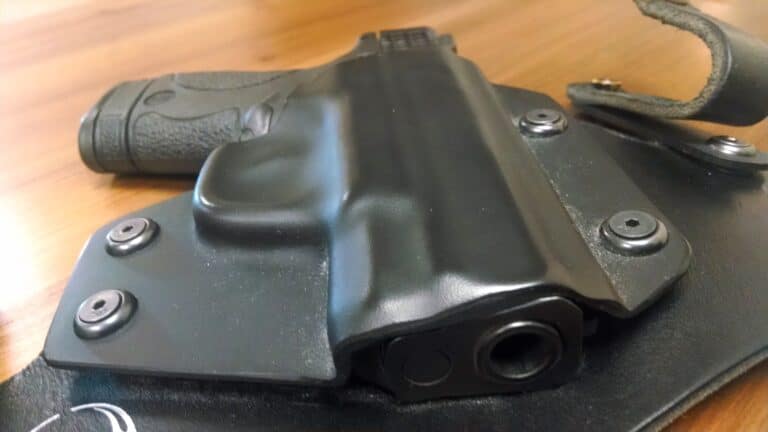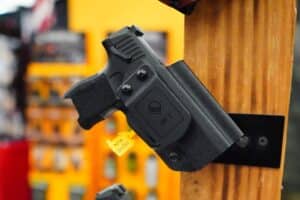The Supreme Court relegated “may-issue” carry permit systems to the dustbins of history, but that doesn’t mean affected states are rolling out the red carpet to prospective gun-toting residents.
States like New York and New Jersey have captured headlines for revolting against the decision by replacing their old systems with new labyrinthian application requirements and location-based prohibitions on lawful carry. But that’s not the only way governments have acted to put up roadblocks to public carry. Some have determined that by levying exorbitant fees on obtaining a license, they might be able to dissuade the exercise of a constitutional right.
Last week, the city of La Verne, California, finally unveiled its application process for residents wishing to obtain a Carry Concealed Weapon (CCW) license, nearly nine months after the Supreme Court’s decision in New York State Rifle and Pistol Association v. Bruen. If the delayed rollout wasn’t enough, the city has decided to further dissuade its residents from carrying by charging nearly $1,100 for all first-time applicants.
The breakdown of fees is listed on the local police department’s website as $398 for “processing,” a $150 administrative fee, a $93 licensing fee, $20 for fingerprint scanning, $150 for a department-approved psychological review, a $250 estimated cost for an approved safety and training course, and a $20 fee for the physical CCW card. All in, the city’s residents would have to fork over $1,081 just to carry a firearm in public for self-defense.
The city’s cost structure is certainly punitive. Still, it’s just a single example in one of the half-dozen states that have been forced to accept that regular citizens must now be provided an opportunity to carry if they so desire. Its pricey permitting gambit raises the question of whether other jurisdictions are pursuing a similar strategy to try and resist public carry.
Here’s a rundown of where affected states have chosen to stand with regard to permitting fees following the Bruen decision.
New York
Despite taking an antagonistic approach to the Supreme Court’s ruling with its replacement carry law, the Empire State left much of its guidance on permitting costs unchanged. That’s because the state provides wide latitude and discretion to local licensing agencies on how much they can charge for issuing licenses to carry to their residents.
In fact, I was unable to find a minimum fee requirement anywhere in state statute. As a result, the costs to acquire a carry permit vary widely for residents of New York, depending on where they live.
New York City residents face some of the steepest costs to apply. The NYPD charges $340 for the initial application fee and for renewals, which are required every three years. Additionally, the city charges applicants $88.25 for its fingerprinting/background check fee. Applicants will also be required to cover the cost of meeting the required 18-hour training course from a department-approved trainer, which can cost hundreds of dollars itself.
By contrast, upstate Onondaga County simply charges $3 for its application processing fee, in addition to the cost of completing the required training and background check.
New Jersey
Unlike New York, the Garden State chose to ratchet up its concealed carry permit fees in its version of a Bruen-response bill.
State law now stipulates a $200 application fee, a $20 fee to run a criminal history check, a $50 fee to actually receive the permit, plus the cost incurred to meet the state police-approved training course requirement. Local issuing agencies appear to be granted some discretion to charge their own fees. The Trenton Police Department website, for example, lists its own $50 application fee.
Additionally, beginning later this year, carry permit holders must “maintain liability insurance coverage insuring against loss resulting from liability imposed by law for bodily injury, death, and property damage sustained by any person arising out of the ownership, maintenance, operation, or use of a firearm carried in public.”
The law further stipulates that the minimum coverage required is a $300,000 policy to account for “injury to or death of more than one person and for damage to property, in any one incident.”
Because such a policy does not yet exist, and may never exist, the additional costs to comply are still to be determined.
California
The Golden State offers a mix of state guidance and local discretion regarding concealed carry permitting costs.
State law establishes a floor of $44 to be delivered to the state by the local licensing authority, and it caps the fee local authorities can charge for the permit itself at $120. It also grants discretion for local licensing authorities to require a psychological evaluation, but it caps the cost of that evaluation at $150. State law also limits the cost of renewals, which must occur every two years, between $25 and $100.
Other costs—including those incurred to meet the state’s 16-hour training requirement and for fingerprinting—can vary by locality. As a result, you can end up with a city like La Verne that chooses to abuse its discretion by charging exorbitant fees to issue permits.
Meanwhile, according to some estimates, the average all-in cost to obtain a license statewide is around $300-$400. However, since the state is currently considering its own version of a New York-style Bruen-response bill, it’s entirely possible that California lawmakers will add new fees for permit applicants.
Hawaii
License-to-carry applicants in Hawaii are currently subject to a $10 application fee under state statute. The licenses are valid for only one year, and renewals are subject to the same $10 fee. Additional fees from the applicant’s local licensing agency may also apply. For example, Honolulu charges a $43.25 background check fee. Applicants must also cover the cost of completing a government-approved 8-16 hour training course.
Maryland
Maryland’s “Wear and Carry” permit application is handled through an online portal run by the Maryland State Police. The state police currently charge a flat $75 application fee, plus a fingerprinting and background check fee that can run up to around $50. The state also requires applicants to complete an approved safety and training course, which typically costs “anywhere from $250 to $400 and up,” according to the group Maryland Shall Issue. Renewals cost $50 and must be done every two years.
Massachusetts
Massachusetts levies a $100 application fee for first-time applicants and renewals under the age of 70 (over 70 is free). The fee structure is established in state statute, though local issuing authorities may have separate fees for fingerprinting and background checks. License-to-Carry applicants must also pay for and complete a firearms training course certified by the state police. The permits are valid for six years.
Comparison to Other States
Most other “shall-issue” states tend to charge somewhere around $50-$100 for carry permits, with some discretion for local fees and the additional cost to complete any training requirements.
State law in Colorado, for example, caps the cost at $52.50 but allows local licensing agencies to charge up to $100 on top of the state fee for processing, fingerprinting, and background check. The permit is valid for five years, and it can be renewed for a cost of $63 total. That fee structure has remained the law since 2003, despite the state’s current deep-blue political tilt.
Florida, one of the longest-standing shall-issue states, establishes a state fee structure that charges $42 for fingerprint processing, $55 for the licensing fee, and allows local issuing agencies to charge a maximum of $22 on top of that. The Florida permit is valid for seven years and costs $45 to renew.
Meanwhile, other states like Indiana offer residents the opportunity to pay a one-time $125 fee, which includes both state and local costs, for a lifetime carry permit. And that is to say nothing of the other option its residents have, much like those of 24 other states, which is to carry for free under the state’s permitless carry regime.
In other words, gun carriers in the former may-issue states are getting a raw deal when it comes to permitting cost compared with those in shall-issue, and especially permitless, states. Even the states with relatively modest fee requirements, like Hawaii and Maryland, impose such short lifespans on their permits that the costs still add up over time due to the necessity of frequent renewals.
Only Massachusetts, with its fixed fee requirement and six-year permits, offers a comparable option to most other shall-issue states.
So, while the application costs unveiled by the city of La Verne might be the most egregious outlier, it seems most of the other former may-issue jurisdictions are out of step with the rest of the country on permitting costs as well.







3 Responses
Clarification on California costs. Current law allows an issuing agency (either the local chief of police or sheriff) to require UP TO 16 hours of training for an initial permit. Many only require 8 hours for the initial permit.
Good point. Thanks!
I certainly favor every firearms’ owner receives training, but I do not see the sense of making it mandatory. Here’s why. The lack of reciprocity with other states, like CT and FL required mandatory training. I recall spending a bit more than half the training time filling out the CT State form making sure all my “i”s were dotted and “t”s crossed rather than learning other more necessary skills pertaining to real life situations. Yes, we had to fire a few shots into a target and smile pretty for our permit photo. What a joke. As a responsible citizen I took many other training courses, which were beyond any State mandatory requirement. I will go a step further by saying I still need more training as we never stop learning. Whether or not other gun owners follow what I have done is their own business.
Frankly, I see and read about more accidents with power tools like table saws, etc with no training requirements. Look! We cannot fix stupid. In a free society it is up to all of us to turn our ignorance into knowledge. If one cares about people, being educated is the right thing to do. I trust most people will want to go far beyond just the basics.